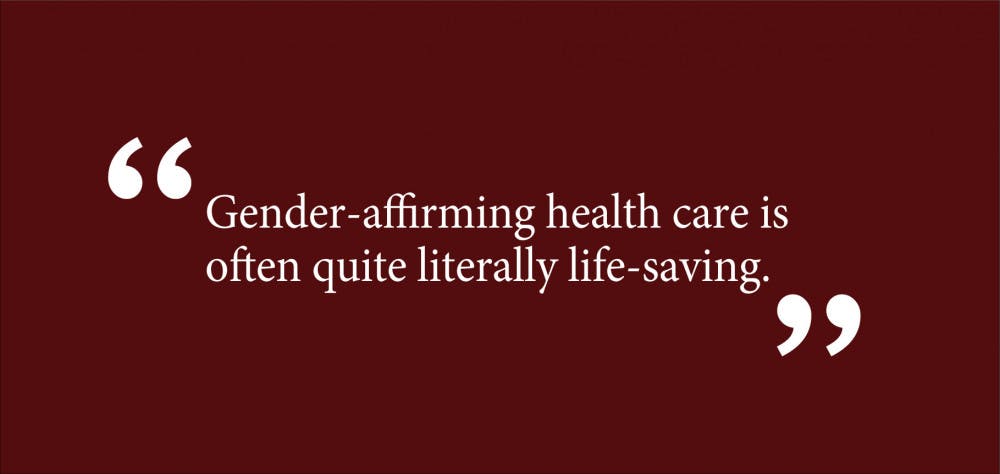Several state legislatures are considering bills that would restrict medical treatment for transgender youth by making it illegal for doctors to provide puberty blockers, hormone replacement therapy and sex-reassignment surgery to minors. Republican lawmakers argue that minors are not mature enough to make such “life-altering” changes. But this argument is based on a flawed understanding of how gender-affirming treatment actually works. Ultimately, these bills are misguided — and have the potential to harm transgender youth.
First, while these bills ban both puberty blockers and HRT for minors, most of the bill’s supporters seem not to understand the difference between the two treatments.
When conservatives attempt to stoke fear by telling stories about transgender children taking “hormones” at 12 or 13 years old, they are often talking about puberty blockers — a safe and reversible treatment. The earliest medical treatment available to transgender youth is a prescription medication; known as puberty blockers, these drugs simply delay puberty and are completely reversible. If someone taking puberty blockers realizes that they do not want to transition after all, they can stop taking the blockers and will undergo natal puberty. While there are some risks associated with puberty blockers, such as potential impacts on bone density, it is the responsibility of doctors, patients and their parents to weigh the risks of any medical treatment — not that of lawmakers. Almost all medical treatments, including those given to minors, are associated with risks. For example, doctors regularly prescribe isotretinoin to teenagers to treat acne, though this medication can cause side effects including joint pain, low bone density and potentially seizures, and we don’t see lawmakers proposing to ban it. Furthermore, these laws do not prevent doctors from prescribing puberty blockers for other medically approved purposes; for example, puberty blockers have been used for more than three decades to treat precocious (early) puberty. Moreover, many people who support these bills seemingly do not understand how puberty works. One of the most common arguments I’ve heard is “why don’t kids just wait to start HRT until they are 18?” But by the time someone is 18, they will have already gone through most of natal puberty, which has lasting impacts. While puberty blockers are completely reversible, natal puberty is not. By denying minors puberty blockers, lawmakers would effectively force transgender children to go through a puberty that does not align with their gender identity.
It is true that while puberty blockers are completely reversible, the impacts of HRT can be permanent. The potential of long-term use to impact bone density means that doctors often recommend that transgender youth not stay on puberty blockers for more than a few years, so at age 16, they can choose to switch from taking puberty blockers to HRT. Transgender youth who take HRT must do so under the supervision of a doctor, and almost always with the consent of their parents. While 16-year-olds are legally minors, this does not mean they are not old enough to make life-changing decisions. For example, in my home state of Georgia — where a state lawmaker has advocated for a similar bill — teenagers can legally drop out of high school at age 16. At age 17, teenagers are automatically charged as adults in Georgia’s criminal justice system. In many states, 16-year-olds get behind the wheel every day— and decide whether to drive safely or engage in risky behaviors like texting and driving. While the decision to begin HRT is not one to take lightly, it is one 16 and 17-year-olds are capable of making responsibly.
Finally, these laws would ban gender reassignment surgery for minors. But such surgery for minors is rare. The only surgery that is even an option for minors is a mastectomy for female-to-male patients, and the minor typically must have taken HRT for at least a year, meaning they’d be at least 17 years old. At the end of the day, this provision appears to be a solution in search of a problem.
Laws restricting health care for transgender youth are clearly based on faulty logic. But these laws aren’t just misguided: If they go into effect, they will endanger transgender teenagers across the country by denying them appropriate health care. The American Academy of Pediatrics recommended in 2018 that young people have “access to comprehensive gender-affirming and developmentally appropriate health care.” Transgender teens often face mental health issues, including gender dysphoria, which can be exacerbated by going through the “wrong” puberty. Transgender teens have high rates of suicide and suicidal thoughts — thus, gender-affirming health care is often quite literally life-saving. In fact, a recent study linked receiving puberty blockers to lower odds of suicidal thoughts. Being denied access to this care can have severe consequences: According to the same study, nine out of 10 transgender adults “who had wanted but were denied pubertal suppression reported having suicidal ideation during their lifetime.”
So please: If you live in South Dakota, Colorado, Oklahoma, Missouri, Illinois, Kentucky, West Virginia, South Carolina or Florida, contact your state representatives and governor to tell them that at the end of the day, bills preventing transgender youth from receiving appropriate health care are both misguided and dangerous.
Rebecca Aman ’20 can be reached at rebecca_aman@brown.edu. Please send responses to this opinion to letters@browndailyherald.com and op-eds to opinions@browndailyherald.com.





